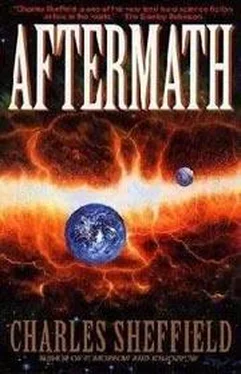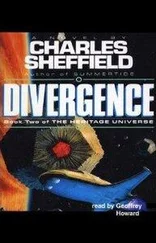Dana was not with him. To Art’s great irritation, when Ed and Joe suggested that she stay behind with Helen, she had meekly agreed. She had also stuck her tongue out at him.
The door looked exactly as it ought to, locked and with the little red tag on the left side in the I am out position. Art didn’t have his keys. They were in a toolbox on the tractor he had ridden south, which was now God-knows-where. He stooped down to retrieve the spare from under the foot-scraper, aware as he straightened up that two rifles were lined up on the house. He suspected that they were aimed at the door, which meant right at his back.
He breathed deep, inserted the key into the lock, and pushed the door open. Everything seemed exactly the way that he had left it — even the plate and dirty coffee cup on the table. He took a step inside.
All quiet.
He turned and waved. Joe walked slowly toward the house, his finger on the rifle’s trigger and the safety off. Ed came along thirty steps behind, covering him.
There were few places where anyone or anything could hide. Inside a minute, Art could nod and say with confidence, “I’m sure. They haven’t been here yet.”
“So what do we do now?” Ed asked. He held the gun easily, a man who often carried his rifle or shotgun hour after hour, ready to aim and shoot and kill game that might be gone and out of sight in a fraction of a second. Joe was outside again, standing watch.
“Well, I wish you’d done it before you came in.” Art looked at the trail of mud that the other two had carried in on their boots. “I’ll have to clean this mess up.
But one thing I’m not going to do is lock the place. I don’t want my door smashed in.”
“It’s nice to see you have your priorities in order. You don’t mind being turned into chopped chicken liver, so long as your house stays intact and the floor’s not dirty.”
“I think that you two should go back home, Ed. I’ll stay and keep an eye on this place.”
“Very rational. So you stay here how long. And you eat when? And you sleep when? And when it rains like mad or gets freezing cold, you do what? You sure as hell can’t stay inside this house and wait for Frank and Drac to arrive.”
“I don’t want you and Joe, or Dana or Helen or Anne-Marie, exposed to danger.”
“I see no reason why we should be. Seth Parsigian knows about this place, but he doesn’t know where me and Joe live. He doesn’t even know we exist. He’s not going to do a local home survey when he gets here, he has other things on his mind.”
Art hesitated. What Ed said seemed to make sense, even though he was, in his wife’s words, a drunken Irish sot, and in his best friend Joe’s words, as witless and confused as a freshly fucked owl.
“We can’t just ignore this house, Ed. Either Seth, or Oliver Guest, or both of them, will be here at some point.”
“We don’t ignore it. We come here every day — twice a day — and we do what we just did. You inspect it, with plenty of firepower as backup. Your friend and Dr. Guest may be tough customers, and they may get nasty; but I doubt they win many arguments with bullets.”
It was logical, and Art could suggest nothing better. But it felt wrong. Ed didn’t know Seth, and to all of them here at Catoctin Mountain, Oliver Guest was little more than a name and an unpleasant legend.
The sense of uneasiness lasted while he cleaned mud from the floor, carefully closed the front door, and walked with the other two back toward Ed’s house. The strong gusts of morning wind had ended. The afternoon had become hot and leaden, depressing Art’s spirits and dulling his mind.
He comforted himself with the knowledge that no matter what happened, Dana and his friends could not be harmed.
From the secret diary of Oliver Guest.
Chance, as Louis Pasteur famously remarked, favors the prepared mind.
Actually, my hero among nineteenth-century medical researchers is not the Frenchman Pasteur, flamboyant and ebullient, but his methodical, painstaking, physically unprepossessing German contemporary and rival, Robert Koch. Koch it was, not Pasteur, who in rigorous Teutonic fashion established the procedural rules for modern bacteriology and virology, those tunes to which all serious research workers even today must dance.
However, Pasteur’s well-known comment encourages a converse statement: Chance can transform or undo the most careful planning.
I had proof of this when Seth Parsigian and I headed for the place where we were to meet his colleagues. He had provided the method of transportation, an ugly box of a car that in its distant heyday must have been a sports utility vehicle. There was something that looked like dried blood on the passenger seat, concerning which I made no comment.
I loaded into the rear compartment a dozen boxes, complaining of their weight and of my own physical weakness. He offered no sympathy. I expected none, even had the weakness been genuine. As I packed the boxes, I explained what they were. When I said “test kit” I did not mean some tidy package or sealed plastic unit, where the press of a button popped final results up on a display. For that type of innately digital analysis, microchips would be an absolute essential. What I could provide used old-fashioned chemical tests, with reagents and precipitates and the comparison of colors. The work was not difficult, but it could be messy. And as soon as we reached our destination (but not before) I promised that I would reveal to Seth and his colleagues the sequence of tests to be performed, and their interpretations.
We both knew the other significance of that coming revelation. Once Seth knew how to do the tests, my vulnerability would increase enormously. As the endgame began, I was in danger of losing my queen. I knew — and he knew — that I needed a countermove.
He stared at me strangely when, with the car loaded and ready to go, I went back into the garden and collected Methuselah. “I won’t have a chance to come back and get him later,” I explained as I placed the box tortoise, appropriately, in with the other boxes in the rear compartment.
You won’t have much use for turtles where you’ll be going, his look said. But of course, he could not suggest that to me. We were still playing the game of mutual trust and goodwill, assisted on his part by a loaded gun.
He told me to drive. He would navigate. That was when I learned he had never before visited our destination.
So whose house was it? As we drove north I became increasingly apprehensive. I saw everything with heightened senses. Remember, this was my first opportunity to observe the effects of Supernova Alpha in a normal setting. My experience to date had been the emergence from the syncope facility, a bizarre river journey, and days of confinement within my own house and garden.
I drove slowly and carefully. The antique car would not go fast, and Seth did not need to remind me that police interest in our vehicle, for whatever reason, offered worse dangers for me than for him.
Our stately progress offered plenty of opportunity for observation. Seth’s occasional descriptions of the past two months had suggested to me a world shattered and shaken by the supernova. I had no reason to doubt what he said, and certainly what I saw on the highway offered much evidence to support his view. Hardly a car or truck was familiar, and the changes were not those that I might have reasonably expected after five years in judicial sleep. The vehicles had a jerry-built look to them, things of rags and patches.
On the other hand, they moved. And their drivers, except for an air of antiquity that matched the cars, seemed perfectly cheerful. Their manner said, we have faced the worse effects of the supernova; they’re over, and we’re going to beat this thing.
Читать дальше












